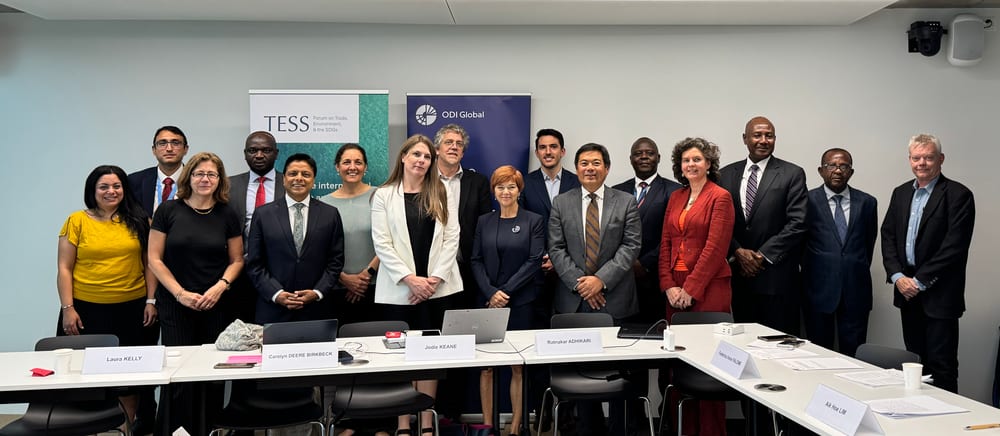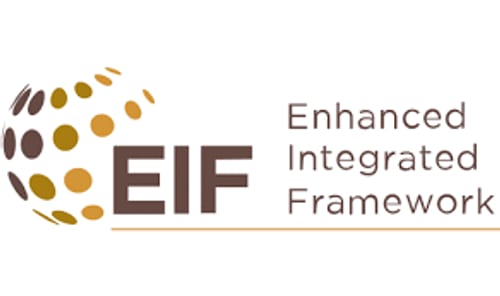Practical solutions emerge to bolster trade cooperation, mobilize finance and harness green technologies for structural economic transformation and climate-resilience in vulnerable countries.

In Geneva on 4 June, a vital dialogue was convened, bringing together trade and climate negotiators from least developed countries (LDCs), alongside leading experts, to explore and advance the urgent mission of securing climate-resilient trade and development pathways for LDCs. The workshop, held in a hybrid format at the Geneva Graduate Institute, marked the first in a series designed to foster an effective community of practice at the nexus of trade and climate-resilient development.
This collaborative effort was organized by ODI Global, the International Institute for Environment and Development (IIED), the Forum on Trade, Environment, & the SDGs (TESS) and the Enhanced Integrated Framework (EIF). It brought together over 40 participants, with strong representation from LDCs both in-person and online. Countries included, among others: Burkina Faso, Bhutan, Chad, Haiti, Lesotho, Laos, Madagascar, Mozambique, Sierra Leone, Uganda and Vanuatu.
Why This Dialogue Matters Now
The world faces a complex geopolitical landscape, with climate change intensifying and trade policies evolving rapidly. LDCs, despite contributing minimally to global greenhouse gas emissions, bear the brunt of climate impacts. They face a complex web of interconnected vulnerabilities, including displacement from conflict, refugee crises, and mounting debt stress, alongside direct effects of climate change on their economies and production capacities. Alarmingly, 17 of the 20 most climate-vulnerable economies worldwide are LDCs. And for 35 out of 46 LDCs, over 60% of their export revenue comes from commodities directly threatened by climate change.
Economically, LDCs account for a mere 1% of global trade flows, even while comprising nearly 15% of the global population. This precarious position is further challenged by unfulfilled commitments on climate finance and technology transfer, and new risks to export interests, particularly from emerging green trade measures.
Key Discussions and Takeaways
The workshop, titled Securing finance and technology for LDCs’ climate-resilient development: the role of trade and international cooperation, explored critical areas:
Session I: Laying the groundwork for climate adaptation in trade.
The opening session highlighted how climate change exacerbates existing LDC challenges like food insecurity, conflict and debt. Speakers stressed the urgent need for structural transformation and an integrated, resilience-based development approach. They called for trade policy to actively recognize and respond to these interconnected realities, supporting LDCs in economic diversification.
The human impact of the climate crisis on LDCs was powerfully articulated. H.E. Jean Pierre Baptiste, Ambassador and Permanent Representative of Chad to the United Nations Office, drew attention to his country's realities: “Volatile rainfall and severe floods in 2022 and 2024 have disrupted agricultural production, pushing food insecurity from 2.1 million people in 2022 to an unprecedented 3.8 million in 2024. Hence, building climate resilience into our trade strategies is a necessity for survival and development.”
Ambassador Baptiste further emphasized that “a key priority for LDCs is to ensure that addressing environmental challenges does not leave them further marginalized in global trade.” He highlighted the critical role of support mechanisms like the EIF and the broader Aid for Trade (AfT) Initiative in fostering economic diversification, developing supply-side capacity and meeting evolving market standards. LDCs, he underscored, are also calling for various forms of cooperation to foster technology co-development, access, transfer, absorption, and adaptation to local conditions.
Session II: Leveraging country platform approaches for climate-resilient trade and finance in LDCs.
This session explored how country platforms and frameworks like Aid for Trade can be instrumental in mobilizing crucial finance. Discussions underscored the shift needed from vulnerability to resilience. While significant climate finance is committed globally, less than 1% reaches LDC adaptation efforts, and over half is through loans, worsening debt distress. The need for more grants, particularly for adaptation, was stressed. Participants called for more transparent, accessible carbon markets and a systemic shift in donor coordination, noting that the burden of coordination often falls unfairly on recipient countries.
Ratnakar Adhikari, Executive Director of EIF, emphasised the pivotal role of EIF’s National Implementation Units (NIUs) in enabling LDCs to mobilise resources and enhance their capacity on the ground. He highlighted how these country-driven units successfully develop bankable projects and coordinate efforts.
Mr Adhikari shared examples of NIU-led success: In Gambia, including trade and climate in the national development plan, led to a US$104 million green industrial park project submitted to the Green Climate Fund. Vanuatu's NIU mobilised an additional US$15.8 million from New Zealand for climate-resilient seafront reconstruction (on top of EIF's US$3.15 million). In Rwanda, the NIU's work on an e-waste policy attracted foreign direct investment, demonstrating their critical impact.
Session III: Addressing LDCs’ technology needs and priorities for climate-resilient development.
The final session delved into strategies for bridging the technology gap. While LDCs clearly identify their technology needs through assessments (including, for instance, over 110 UNFCCC Technology Needs Assessments (TNAs)), fewer than 50 of over 500 proposed Technology Action Plans have been funded, revealing deep structural barriers. The potential of green technologies for LDCs' growth was highlighted, with Africa’s opportunities in green fertiliser, bauxite processing and green steel. In regard to access, the discussion underscored that the primary barrier isn't always the technology itself, but the high cost of capital required for its uptake and adaptation to local realities.
Carlijn Nouwen of Climate Action Platform Africa made a powerful case for Africa's potential for 'climate-positive growth,' advocating for identifying mutually beneficial climate opportunities where the continent can be a global provider of green solutions.
The importance of cooperation and partnerships in technology development was noted, including the need to identify and scale up local technological solutions. The importance of accessible databases, private sector engagement and effective capacity building for technology adoption was emphasised.
Looking Ahead: A Collective Path to COP30 and MC14
The workshop concluded with a strong call for continued collaboration, emphasizing the importance of sustained and enhanced attention and focus on LDCs' priorities on trade and climate resilience. With this in mind, the organizers highlighted their willingness to support further opportunities through this dialogue series to strengthen engagement on the road to COP30 in Belem, Brazil, in November, and the next WTO Ministerial Conference (MC14) in Yaoundé, Cameroon, in 2026.
To articulate the path forward and reinforce the workshop's key messages, the organizing partners offered their concluding reflections:
Central to the trade and climate agenda must be a stronger focus on intersecting challenges that LDCs face in adapting to the climate crisis, advancing structural economic transformation, and fostering climate-resilient development,” stated Dr. Carolyn Deere Birkbeck, Executive Director of TESS. "Today, we have had the opportunity to explore LDC-specific vulnerabilities and how cooperation on trade, finance and technology can more effectively address these interconnected challenges.”
“The challenges facing LDCs at the intersection of climate and trade are immense, yet so are the opportunities for transformative change,” added Dr. Jodie Keane, Senior Research Fellow, ODI Global. “We must bring adaptation to the forefront of trade policy, recognizing that a 1.5°C world is locked in and requires new, integrated approaches to protect and diversify LDC economies. This workshop series is about creating a shared space where negotiators can exchange, learn and collectively strategize to turn these challenges into pathways for resilient development.”
“Bringing together the trade and climate communities, especially from LDCs, is no longer an option but a necessity,” affirmed Laura Kelly from IIED. “The insights and connections forged last week in Geneva are vital steps towards ensuring LDCs are not left behind in the global green transition, but rather become active leaders in shaping it.”
The collaborative spirit and rich discussions underscored the shared commitment of ODI Global, IIED, TESS and EIF to supporting LDCs in securing a more prosperous and climate-resilient future. Further workshops in this series will continue to build on these foundations, exploring views from LDC climate and trade negotiators on priorities and challenges, as well as opportunities and pathways for concrete, coordinated steps toward climate-resilient trade and development.
Workshop Concept Note | Securing climate-resilient trade and development pathways for LDCs - DOWNLOAD PDF
Note conceptuelle de l'atelier : Sécuriser des trajectoires de commerce et de développement résilientes au climat pour les PMA - DOWNLOAD PDF
WTO Committee on Trade and Environment | Perspectives on LDC Environment-Friendly Trade and Trade-Related Climate Challenges (9 May 2025) - DOWNLOAD PDF
-----
Angela Kolongo is Communications and Public Affairs Manager at ODI Global.
Watch the Interview
Listen to key takeaways from the workshop for TESS Executive Director Carolyn Deere Birkbeck.








